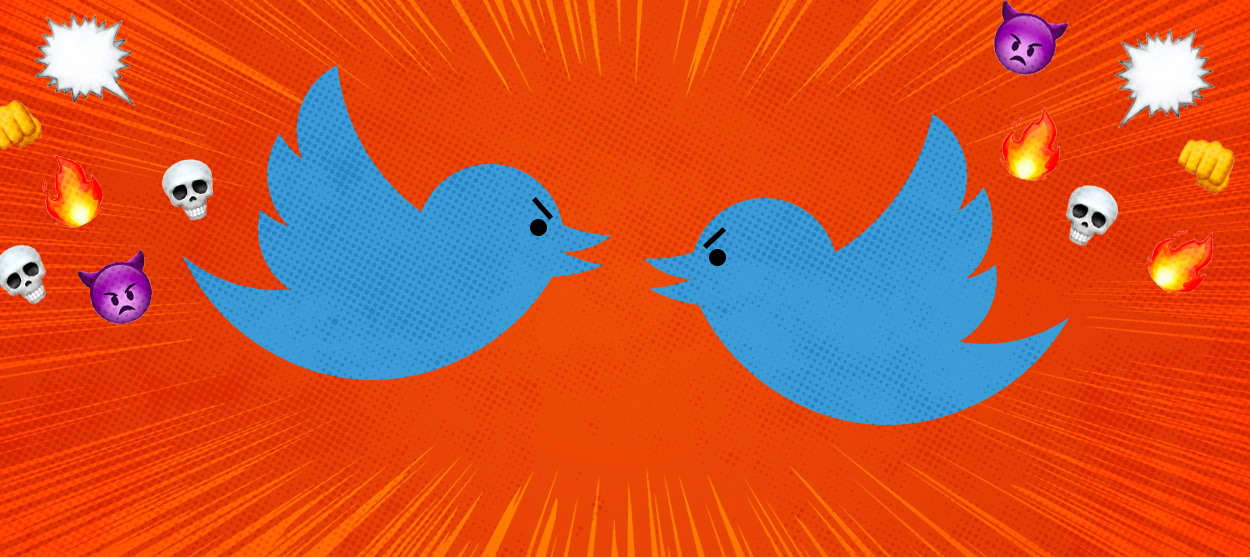What Twitter tells us about human nature
Are we wired to fight?


A free daily email with the biggest news stories of the day – and the best features from TheWeek.com
You are now subscribed
Your newsletter sign-up was successful
Twitter is really important for understanding our present political and cultural moment, and it's really bad for American democracy.
Three-and-a-half years into a political era launched and sustained in large part by the social media platform, these two (related) views are indisputable. But pinpointing precisely what is so politically and culturally pernicious about Twitter can be challenge, in part because its awfulness has multiple dimensions.
There is, to begin with, its impulsive, hyperbolic, and viral character, often rewarding people with a nearly instantaneous, enormous global audience for making sweeping or extreme pronouncements on events — "that big explosion in Beirut was definitely a nuclear weapon!" — in a spirit of uninformed, visceral reaction. That makes Twitter one of the greatest mechanisms ever devised for spreading conspiracies and misinformation. It also makes it one of the greatest mechanisms ever devised for spreading disinformation — intentionally misleading and false claims spread by bad actors to sow mayhem and confusion for a variety of malicious aims.
The Week
Escape your echo chamber. Get the facts behind the news, plus analysis from multiple perspectives.

Sign up for The Week's Free Newsletters
From our morning news briefing to a weekly Good News Newsletter, get the best of The Week delivered directly to your inbox.
From our morning news briefing to a weekly Good News Newsletter, get the best of The Week delivered directly to your inbox.
Then there is Twitter's facility for encouraging tribalism or what is often called the "siloing" of information. People can and do curate their feeds to ensure they hear and interact only with ideas and arguments that reinforce what they already believe, and dismiss anything that might prompt them to question it. Though for many the term "dismiss" is too passive. That's because they also seek out the most extreme versions of ideas and ideologies they detest in order to reinforce the prejudices that prevail within their own meticulously curated digital world. They band together with allies and then go in search of monsters to destroy.
But what if the causality runs just as much in the other direction — not from tribalism to ideological conflict, but the reverse? What if certain people, at least, are motivated at bottom by a craving for conflict, and they form or join together with groups of the like-minded as a byproduct of that agonistic instinct? In that case, Twitter would have to be understood as an engine of antagonism, augmenting and amplifying a deeply ingrained human predilection for discord and dispute, quite apart from the substance of what anyone is fighting about at any given time.
The obvious example is the figure of Donald Trump, whose every combative, insulting tweet becomes an occasion for his critics on the left, center-left, and center-right to point and shout and hurl invective — and for his abundant defenders on the right to scream in response, "Aw, look at the poor libtards driven mad by the Bad Orange Man and their Trump Derangement Syndrome!"
Or consider the brushfire of controversy that's been roiling Twitter over the past several weeks about whether 2+2 can equal 5. The question of the epistemological, metaphysical, and ontological status of mathematical statements has been an important question in philosophy for millennia. Yet those who sparked the ongoing conflagration were not raising serious issues for discussion and debate. They were asserting, for the sake of advancing an agenda of the far left, that mathematics is a cultural construct and thus that the expression "2+2=4" is arbitrary and could easily have been "2+2=5" if only our culture had asserted it to be the case.
A free daily email with the biggest news stories of the day – and the best features from TheWeek.com
Now, this is a singularly ridiculous position. The interesting and worthwhile philosophical debates about mathematics I mentioned above have emerged from reflection on the fact that mathematical statements are in fact true in all times and places. How is this universality possible? What does it imply about the character and foundations of mathematical knowledge? Do we know that 2+2=4 because of a generalization from the repeated and unvarying experience of bringing one group of two things together with another group of two things to make one group of four? Or do we know it because of intuition or some other "a priori" insight apart from experience? And what do the possible answers to these questions tell us about the character of numbers and the relations among them?
But the claim that 2+2 adding up to 4 is so arbitrary that it could just as easily have added up to 5 if our culture had asserted it to be true is pure idiocy. To call it sophistry is an insult to sophists. It's also to claim — against a vast literature of anti-totalitarianism — that if a person is tortured mercilessly enough to affirm the manifest contradiction that 2+2=5, then 2+2 has really and truly become 5, as opposed to that person's mind and will having been broken by the exercise of absolute power.
All of which is to say that the proper response to someone asserting the possible truth of 2+2=5 is to ignore them. Yet that isn't what has happened on Twitter. Instead, people have Taken Sides — with a few lining up in favor of the initial provocation, but many, many more arraying against it, writing long tweet threads in part to dispel the idiocy, but even more so to insist that denial of mathematical truths is a Very Big Problem that will soon be Coming to Public Schools Everywhere if we don't Stand Our Ground and Fight Against It. In at least one case, the tweeting has inspired a 8,400-word essay making these and related points about the danger of 2+2=4 denialism.
For me, the most interesting thing about this entire episode is the question of why anyone thought the initial assertion about the possible truth of 2+2=5 was worth any response (and subsequent publicity for the claim) at all. And the only compelling answer I can think of is that the assertion provided an object and occasion for anger and justified denunciation. "Someone is wrong on the Internet!" has become something of a meme on Twitter to describe this mindset and instinct, and it's apt, as long as we recognize this as something that lots of people apparently consider one of the platform's primary selling points — that it provides an endless forum for conflict, battle, denunciation, and strife.
It would be one thing if there were any evidence that Twitter was functioning as John Stuart Mill's ideal of a marketplace of ideas in which false claims and arguments were systematically exposed, refuted, and dispelled and true ones verified, promoted, and spread. But that's not at all how Twitter works. It just prizes conflict, with both sides usually having ample ammunition and support to fuel its side of the battle until the field of combat moves on to the next skirmish.
In this respect, Twitter differs in important respects from Facebook. Neither social media platform encourages anything resembling the liberal ideal of a healthy and vibrant public square of free-flowing, illuminating deliberation and debate among free and equal citizens. Instead the two platforms enact an anti-liberal division of labor, with Facebook encouraging self-reinforcing feedback loops among the like-minded and Twitter facilitating rancorous discord and verbal violence.
As I recently argued, I'm much less sanguine than I was even six months ago about our capacity to keep our online toxins cordoned off in the digital world. Instead of allowing for a kind of cathartic release and purging of civic animus, under the pressure of real-world social isolation, epidemiological and economic anxiety, and constant political provocation (from the president on down), our online battles appear to be intensifying mutual political hostility and hatred.
Whether this persists and builds or wanes and recedes after the 2020 election remains to be seen. But regardless, so long as so many of us remain active on Twitter, we will be presented with endless temptations and opportunities to fight. And in so doing, we'll be developing intellectual and moral habits more common and suitable to the battlefield than the voting booth. That's not something likely to end well.
Damon Linker is a senior correspondent at TheWeek.com. He is also a former contributing editor at The New Republic and the author of The Theocons and The Religious Test.
-
 Touring the vineyards of southern Bolivia
Touring the vineyards of southern BoliviaThe Week Recommends Strongly reminiscent of Andalusia, these vineyards cut deep into the country’s southwest
-
 American empire: a history of US imperial expansion
American empire: a history of US imperial expansionDonald Trump’s 21st century take on the Monroe Doctrine harks back to an earlier era of US interference in Latin America
-
 Elon Musk’s starry mega-merger
Elon Musk’s starry mega-mergerTalking Point SpaceX founder is promising investors a rocket trip to the future – and a sprawling conglomerate to boot
-
 The billionaires’ wealth tax: a catastrophe for California?
The billionaires’ wealth tax: a catastrophe for California?Talking Point Peter Thiel and Larry Page preparing to change state residency
-
 Bari Weiss’ ‘60 Minutes’ scandal is about more than one report
Bari Weiss’ ‘60 Minutes’ scandal is about more than one reportIN THE SPOTLIGHT By blocking an approved segment on a controversial prison holding US deportees in El Salvador, the editor-in-chief of CBS News has become the main story
-
 Has Zohran Mamdani shown the Democrats how to win again?
Has Zohran Mamdani shown the Democrats how to win again?Today’s Big Question New York City mayoral election touted as victory for left-wing populists but moderate centrist wins elsewhere present more complex path for Democratic Party
-
 Millions turn out for anti-Trump ‘No Kings’ rallies
Millions turn out for anti-Trump ‘No Kings’ ralliesSpeed Read An estimated 7 million people participated, 2 million more than at the first ‘No Kings’ protest in June
-
 Ghislaine Maxwell: angling for a Trump pardon
Ghislaine Maxwell: angling for a Trump pardonTalking Point Convicted sex trafficker's testimony could shed new light on president's links to Jeffrey Epstein
-
 The last words and final moments of 40 presidents
The last words and final moments of 40 presidentsThe Explainer Some are eloquent quotes worthy of the holders of the highest office in the nation, and others... aren't
-
 The JFK files: the truth at last?
The JFK files: the truth at last?In The Spotlight More than 64,000 previously classified documents relating the 1963 assassination of John F. Kennedy have been released by the Trump administration
-
 'Seriously, not literally': how should the world take Donald Trump?
'Seriously, not literally': how should the world take Donald Trump?Today's big question White House rhetoric and reality look likely to become increasingly blurred
